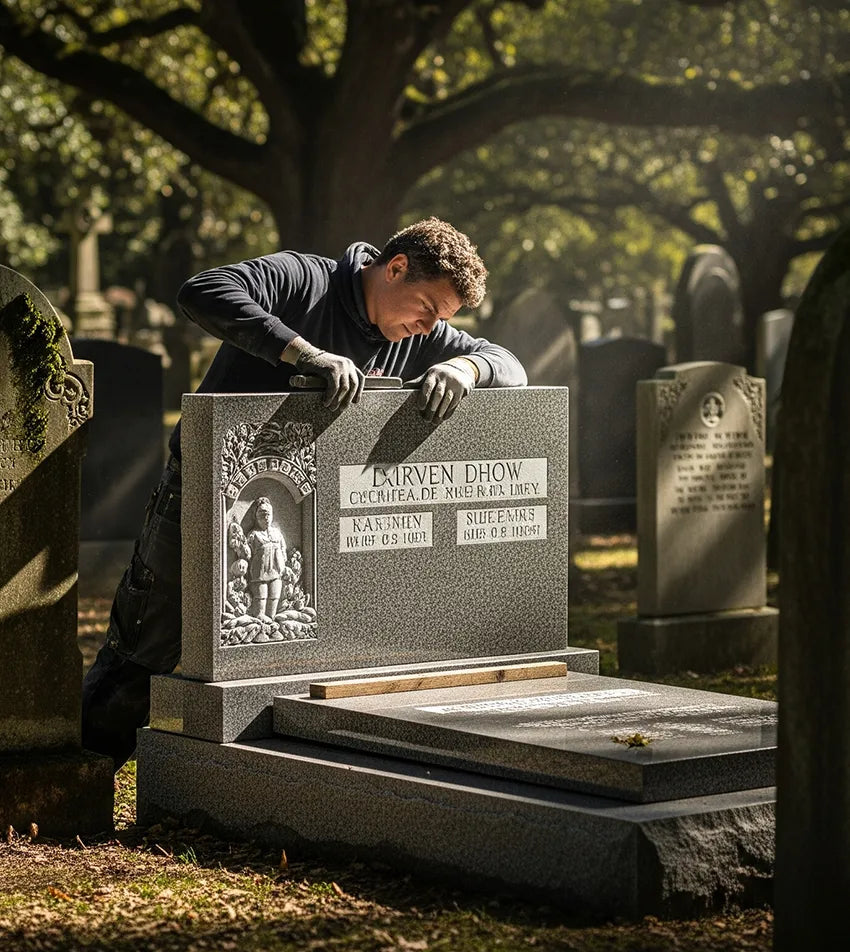
Can I place a gravestone myself?
Sonja JeskeAre relatives allowed to place a gravestone themselves? A guide to cemetery laws in Germany and Europe
When a loved one passes away, family members often face many organizational questions. One of them is: Can we place the headstone ourselves out of respect, solidarity, or simply to save costs? What sounds like a simple request is governed by strict laws and regulations in many countries.
In this article, we examine the legal framework in Germany and take a look beyond the borders into other European countries.
1. The legal situation in Germany: Cemetery regulations are crucial
In Germany, cemeteries are generally governed by the so-called Cemetery and Burial Law , which is determined by the individual federal states and municipalities. In principle, the answer to the question of whether one may place a gravestone oneself is almost always a resounding no .
Why is that?
The erection of gravestones is subject to a permit requirement . Before a headstone may be placed, the cemetery administration must approve the design. This serves several purposes:
-
Safety: An improperly installed gravestone can topple over and pose a danger to cemetery visitors. Gravestones must therefore meet certain safety standards (e.g., DIN EN 14995).
-
Design and aesthetics: Cemetery administrators ensure that gravestones fit into the overall design of the cemetery. Size, material, and shape may be specified in the respective cemetery regulations.
-
Professional workmanship: Only trained stonemasons and stone carvers possess the necessary knowledge and tools to securely and permanently install a gravestone. They are often also responsible for the annual safety inspection of gravestones.
Conclusion for Germany: In almost all cases, it is necessary to commission a qualified stonemason or a licensed specialist company. They will not only take care of the professional installation but also handle the necessary applications with the cemetery administration.
2. Placing a gravestone yourself in other European countries: Differences and similarities
Similar regulations also exist in other European countries, although the enforcement is sometimes more relaxed.
-
Great Britain: There's more flexibility here. Gravestones are approved by the cemetery administration, but it's quite common for family members to participate in the design. However, the actual installation often has to be carried out by a certified professional to ensure safety standards (such as those set by the National Association of Memorial Masons, NAMM).
-
France: The regulations are similar to those in Germany. Municipalities and cemetery administrations are responsible for compliance with the regulations. Gravestones must be installed by a professional who complies with safety regulations. Self-employment is generally not permitted.
-
Poland: Regulations may vary depending on the region and the cemetery operator (e.g., state or church). It is often more common for family members to help with grave maintenance and sometimes even with the erection of the tombstone. However, the stone must usually be placed by a licensed stonemason to ensure stability and permit approval.
-
Scandinavia (e.g., Sweden, Norway): Here, too, permitting is a predominant requirement. The cemetery administration determines which types of gravestones are permitted. The actual installation is usually left to professional stonemasons, as the weather conditions there place special demands on the durability of the foundations.
3. Conclusion for Europe
In most European countries, especially in Central Europe, safety is paramount. Professional gravestone placement by a specialist company is standard practice to prevent accidents and ensure the longevity of the gravestones. The relevant cemetery laws and regulations provide the crucial guidance.
4. What relatives can still do
Even if the erection of the gravestone must be left to the professionals, that doesn't mean that relatives are powerless. Quite the opposite:
-
Participate in the design: Work closely with the stonemason to create the design. From the selection of the stone type to the inscription, you can contribute your own ideas to create a personalized and dignified gravestone.
-
Grave care: Watering the flowers, cleaning the gravestone, and removing weeds are actions that not only help maintain the gravesite but can also represent a form of active grief management.
In most cases, the decision to entrust the installation of a gravestone to a professional is a matter of safety and compliance with legal regulations. This ensures that the memorial site remains permanently safe and dignified for the deceased.
